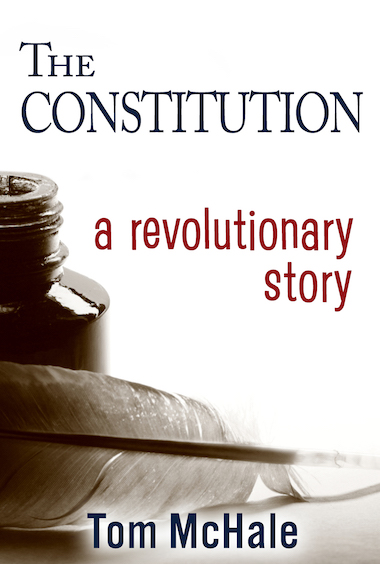I was worried about how to keep this book strictly non-partisan. With all the angst over politics these days I wanted to make sure this book didn’t fall into the same trap. That actually turned out to be easy.
Tom McHale – 25 January 2018
The Back Flap
Who would think that words carved into a 200-year old tree could cause so much controversy in this day and age? Well, technically, it’s not even a tree. While early drafts of the Constitution were likely written on hemp paper, the final was considered significant enough to warrant going out and skewering a sheep to make parchment. Ewww.
The historically accurate and decidedly entertaining owner’s manual, The Constitution – A Revolutionary Story covers the how’s, what’s, and why’s of the United States founding documents – but with a healthy dose of political humor. It offers a historically accurate and informative background on the nation’s founding documents, but unlike the original, it won’t put you into a coma or lead to irritable bunion syndrome. The mission is simple: to make the Constitution so easy to understand that even a career politician can grasp it.
“197.23 trillion people have never read the actual Constitution,” observes author Tom McHale. “OK, so maybe that figure is more of an estimate than a carefully researched fact. Regardless, most people arguing about what’s constitutional and what’s not know less about what it says than they do about the chemical composition of spackle.”
About the book
What is the book about?
The Constitution – A Revolutionary Story covers the underlying concepts of natural rights and the real purpose of consent-based government. Hint: it’s not to subpoena and investigate each other.
The heart of the book is a simplified and fun walk through the events leading up to the creation of the founding documents and a section-by-section look at what it says but in plain language. Digesting the Constitution can be a bit boring, in part because it’s full of strange words like “attainder.” We’re pretty sure that ‘attainder’ has never even been on the Master’s Series of Wheel of Fortune, so how is anyone supposed to know what that is?
This book aims to package constitutional knowledge in a fun and easy to digest format. We’ll guarantee it to be at least 137% less boring than the original.
When did you start writing the book?
I started this book on February 6, 2014. OK, to be honest, it hasn’t taken me nearly four years of continuous work to finish it. There’s a slight chance that the partially-completed manuscript might have collected dust here and there.
How long did it take you to write it?
It took me about six months of consistent work to get it done. Of course, the final stages were a full-on cram session – just like final exams in college.
Where did you get the idea from?
Where did the inspiration come from? That’s easy. Social media. After hearing the 13 billionth accusation that something in the news was or wasn’t constitutional, it became abundantly clear that many people really have no idea of what the Constitution says and means. A close second to the “is it constitutional or not” debate has always been the related one over what rights really area. The most cursory look at constitutional history makes it very clear what types of things do and don’t qualify as natural rights.
Were there any parts of the book where you struggled?
Not really. Before putting pen to paper (OK, fingers to keys), I was worried about how to keep this book strictly non-partisan. With all the angst over politics these days I wanted to make sure this book didn’t fall into the same trap. That actually turned out to be easy. Constitutional issues just are. The left loves some and loathes others while the right reveres different parts and resents others. In the founders’ view, that’s a good thing. It means that there was some serious compromise in the process.
What came easily?
The history leading up to the Constitutional Convention was the most fun and easiest to write. While it’s historically accurate, I had to have some fun with the style. There’s no reason that one can’t learn history and have a few laughs in the process. Knowing the events leading up to the American Revolution and formation of a new government is key to understanding the Constitution. As you’ll see in the book, it was a unique set of circumstances that enabled the great experiment.
The other easy parts, because they were fun to research and write, are the “Matter of Fact” historical soundbites. All true stories, they provide some interesting context. Where else are you going to see the actual itemized bar tab from the night the boys took George Washington out to drink after the Constitutional Convention?
Are your characters entirely fictitious or have you borrowed from real world people you know?
The book is a non-fiction, so the characters are real. The “Matter of Fact” stories will shed some light on the human side of history. You’ll learn what Washington’s false teeth were really made from and why Andrew Jackson wouldn’t kiss babies on the campaign trail. For real.
We all know how important it is for writers to read. Are there any particular authors that have influenced how you write and, if so, how have they influenced you?
Being a certified dork who can laugh at most anything, I would be remiss if I didn’t mention Dave Barry. I’ve always loved his irreverent and somewhat silly style. Catch-22 by Joseph Heller? Arguably one of my favorite books of all time. When it comes to favorite authors, I have a big list ranging from serious to not so much. James Clavell’s historical fiction gave me the reading bug many years ago. Michener’s Space fed that as did Andrew Chaikin’s Man on the Moon. Now I read everything. I love unwinding with the quirky characters in Harlan Coben’s Myron Bolitar Series. I love a good mystery from Patricia Cornwell. The Martian was a great read, and more recently I’ve gotten hooked on Louise Penny’s Armand Gamache Three Pines books. She has brilliant insight into the minds of her characters. I have to stop now, or I’ll end up listing another hundred great authors.
Do you have a target reader?
Yes. Calling all dorks! But seriously, anyone who believes that they can learn something new every day. I love to learn, and I love to share. Oh, there’s one more attribute. My target readers have to be able to find the humor in most anything. Life is way too short to be serious all the time.
About Writing
Do you have a writing process? If so can you please describe it?
I write every single day. As a freelance writer who produces articles in magazines and online publications, I have to or else I don’t eat. On a given day I probably crank out 3,000 to 4,000 words. Part of that is freelance work while I allocate some of my time most days to book projects.
Do you outline? If so, do you do so extensively or just chapter headings and a couple of sentences?
I outline my work part way through the process. Yes, I know that’s entirely wrong and will probably take decades off my life, but it’s the way my brain works. I’ll have a high-level idea that I think will work. To flesh it out, I just start writing. As I get into it, my brain is figuring out the structure that will support the idea.
I use a software product called Scrivener for my longer work. It allows me to write small blocks of text and then easily shuffle them around as my outline takes shape.
Do you edit as you go or wait until you’ve finished?
I edit sections as I go but that’s just the first step. My workflow goes from Scrivener to Grammarly, then back to Scrivener. When a rough draft is complete, it then goes to work for more editing passes. Finally, it goes to eBook and paperback formatting software where I do more editing passes using both eReaders and paperback proof copies. I find that I see the words differently as I “pre-publish” to eBook and paperback formats, so that’s an important editing step.
Did you hire a professional editor?
At this point, I recruit Beta readers from my friends and family circle. That helps test flow and find errors and opportunities for improvement.
Do you listen to music while you write? If yes, what gets the fingers tapping?
It’s interesting that you asked this question. I do my best work while wearing headphones and blasting music at volumes that would make OSHA inspectors have a coronary. When I need to concentrate, loud, loud music is the key. The O’Jays are particularly effective at breaking mental writing block jams. I like variety. My random playlist includes everything from Devo to 80’s music to piano jazz to blues to Motown and…
About Publishing
Did you submit your work to Agents?
I am just starting my search for an agent. It’s amazing how much the right editorial partnership can improve the final product. I see that when working with great editors in the freelance space and am anxious to develop that for my books.
What made you decide to go Indie, whether self-publishing or with an indie publisher? Was it a particular event or a gradual process?
I love the flexibility and creative control you get in the Indie market. A book topic doesn’t necessarily need a potential audience of 10 billion like a standard publishing book title does. You can write for niches of readers with particular interests.
Did you get your book cover professionally done or did you do it yourself?
Both actually. I’ve worked with professionals on some covers and done others on my own. As I devote more of each workday to future book projects, I want to find a professional cover designer who can help me communicate the book’s meaning to potential readers.
Do you have a marketing plan for the book or are you just winging it?
I have a fairly structured marketing plan for my books that include social media presence and support, promo and seed copies to potential influencers, and advertising.
Any advice that you would like to give to other newbies considering becoming Indie authors?
Start writing. Then keep writing. Write every single day – at least something. If you write daily with an eye towards continuous improvement, you’ll quickly see the quality of your work grow. You’ll also just need to start in order to get paying work. Write for free at first until you start developing a reputation in your niche, then people will want to pay you for your work.
About You
Where did you grow up?
I grew up everywhere. Born in Corona del Mar, California, I found myself on the east coast in the Washington, D.C., and Baltimore, MD areas for second grade through high school.
Where do you live now?
Charleston, South Carolina. It’s known as the Lowcountry because it’s full of what marketing-savvy realtors call “wetlands.” Those of us in the know call them “swamps.”
What would you like readers to know about you?
This is all just a side gig until I can realize my dream of becoming a celebrity Hamster Cosmetologist.
End of Interview:
For more from Tom, visit his website, follow him on Twitter, or like his page on Facebook.
Get your copy of The Constitution – A Revolutionary Story from Amazon US or Amazon UK.



